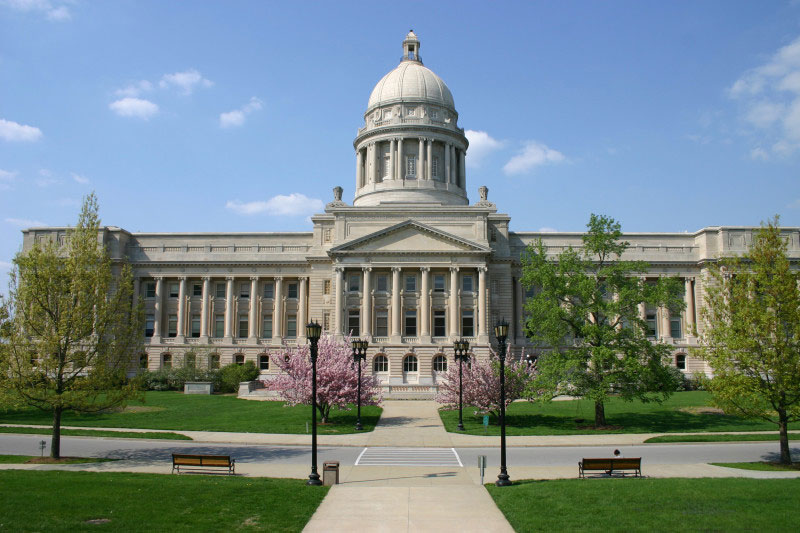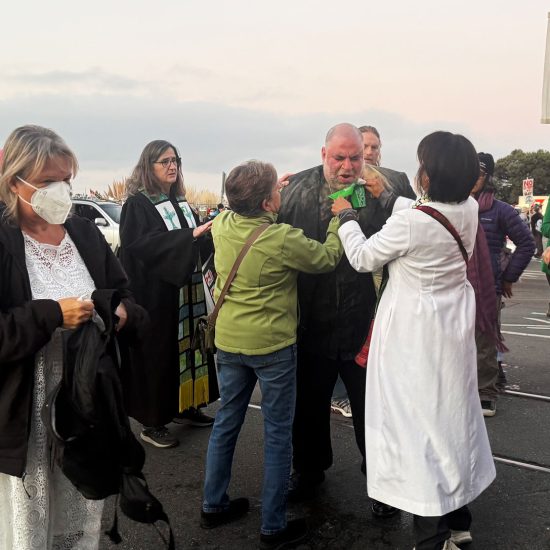
(RNS) — Soon after the right to an abortion was overturned by the U.S. Supreme Court two years ago, a novel legal strategy emerged for challenging new state abortion bans. It argued that near-total bans infringe on religious freedom by imposing a Christian understanding of when life begins.

The Kentucky Supreme Court is one of multiple state courts hearing cases regarding varying levels of abortion bans. Photo courtesy Kentucky Tourism
Last month, that strategy took a beating in the courts.
On Friday (June 28), a Kentucky judge dismissed a lawsuit brought by three Jewish mothers who argued the state’s near-total abortion ban violated their religious freedom. Among their claims, the women argued the abortion ban violated Kentucky’s Religious Freedom Restoration Act, which states the government “shall not substantially burden a person’s freedom of religion.” Their faith — Judaism — they claimed, allows for abortion and in some cases requires it.
Jefferson County Circuit Judge Brian Edwards said the group of women lacked standing to bring the case because they were not pregnant and therefore suffered no injury by the law.
In another case earlier in June, a Missouri judge rejected a clergy-led effort to halt the state’s near-total abortion ban. A coalition of 14 Christian, Jewish, and Unitarian leaders argued that some religions require access to an abortion and that Missouri law imposes the beliefs of one religious tradition on others — a direct attack on freedom of religion.
St. Louis Circuit Court Judge Jason Sengheiser wrote: “While the determination that life begins at conception may run counter to some religious beliefs, it is not itself necessarily a religious belief.”
But advocates argue the religious freedom argument is not yet dead.
In both the Missouri and Kentucky cases, appeals are planned.
“We are in the middle of a long, drawn-out twilight struggle, and the steps that we’re taking are the first steps in a very long journey,” said Ben Potash, one of the lawyers who filed the Kentucky complaint and is now working on an appeal.
In Kentucky, Potash pointed out, the judge didn’t even rule on the merits of the case, dismissing it on the basis of standing, or whether the plaintiffs had cause to bring suit in court. The judge found the alleged injuries in the women’s case were hypothetical.
Potash said the appeal will argue the three Jewish women’s standing is not hypothetical. All three women require in-vitro fertilization to become pregnant but are afraid of beginning the procedure without greater clarity about what the law will permit them to do with excess frozen embryos, or whether they would be required to continue carrying implanted embryos that are determined to be not viable. The three women argued that having more children is a religious obligation.
“This ruling ignores critical issues central to our case, which impact many individuals and families across our state,” the three women — Lisa Sobel, Jessica Kalb, and Sarah Baron — said in a statement. “Our lawsuit seeks clarity on Kentucky’s complex and conflicting anti-abortion laws, spanning over 80 pages and written over the past 50 years. These laws affect families using assistive reproductive technologies like IVF, creating legal uncertainties that are emotionally and financially burdensome.”
In the Missouri case, the judge acknowledged the difficulty of settling the question of whether “life begins at conception” is a religious belief.
That creates an opening for appealing the case. Rachel Laser, president and CEO of Americans United for Separation of Church and State, which brought the case on behalf of 14 Missouri clergy, said the religious freedom argument is still relatively new.
“We are pioneers when it comes to making this argument today before courts,” said Laser. “Don’t forget that for nearly 50 years, the right to abortion was settled law under the right to privacy so we didn’t need to make these arguments at the same time, even though they were also true.”
There was one bright spot in the religious freedom arguments. In April, an Indiana Court of Appeals unanimously affirmed a challenge brought by Hoosier Jews for Choice, four anonymous women who allege the state’s abortion ban infringes on their religious beliefs and therefore violates Indiana’s Religious Freedom Restoration Act.
The court sent a preliminary injunction back to a trial court for a narrower take.
“We have a long road ahead, and we’re going to stay the course in Kentucky along with Indiana, Missouri, Florida, and anyone else who wants to join us,” said Potash. “We are going to continue to fight until we win.”






